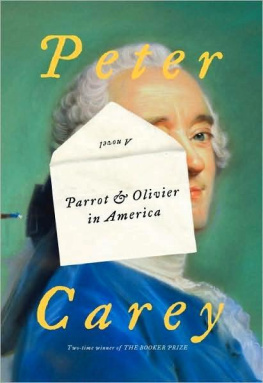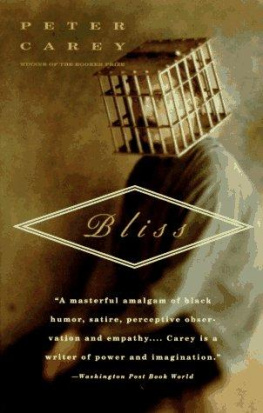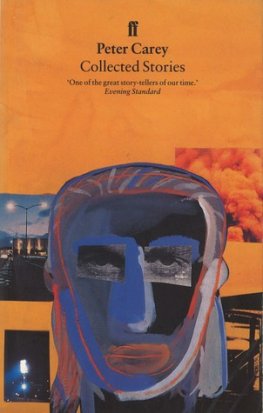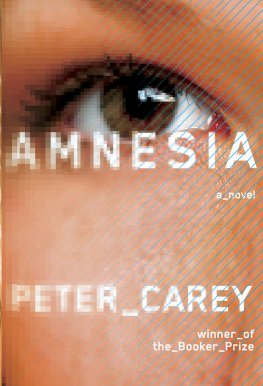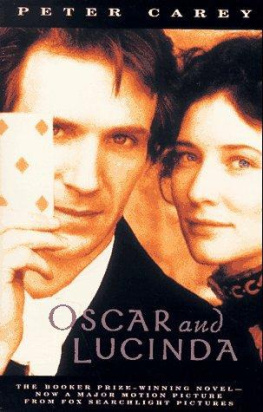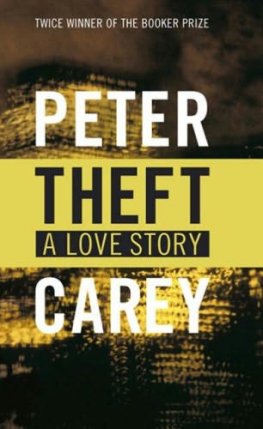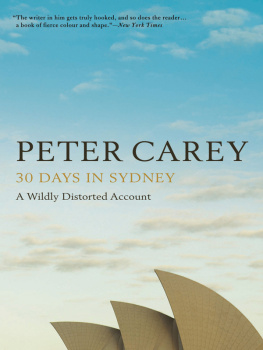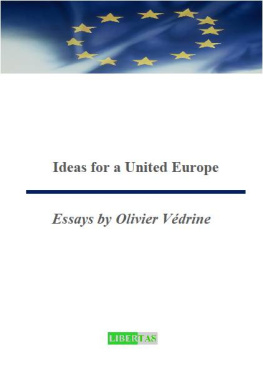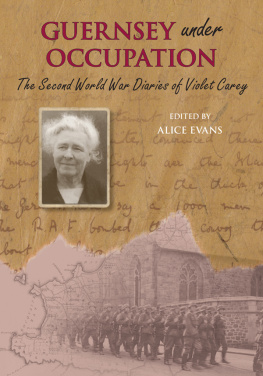Peter Carey - Parrot and Olivier in America
Here you can read online Peter Carey - Parrot and Olivier in America full text of the book (entire story) in english for free. Download pdf and epub, get meaning, cover and reviews about this ebook. year: 2009, publisher: Knopf, genre: Non-fiction. Description of the work, (preface) as well as reviews are available. Best literature library LitArk.com created for fans of good reading and offers a wide selection of genres:
Romance novel
Science fiction
Adventure
Detective
Science
History
Home and family
Prose
Art
Politics
Computer
Non-fiction
Religion
Business
Children
Humor
Choose a favorite category and find really read worthwhile books. Enjoy immersion in the world of imagination, feel the emotions of the characters or learn something new for yourself, make an fascinating discovery.
- Book:Parrot and Olivier in America
- Author:
- Publisher:Knopf
- Genre:
- Year:2009
- Rating:4 / 5
- Favourites:Add to favourites
- Your mark:
- 80
- 1
- 2
- 3
- 4
- 5
Parrot and Olivier in America: summary, description and annotation
We offer to read an annotation, description, summary or preface (depends on what the author of the book "Parrot and Olivier in America" wrote himself). If you haven't found the necessary information about the book — write in the comments, we will try to find it.
Parrot and Olivier in America — read online for free the complete book (whole text) full work
Below is the text of the book, divided by pages. System saving the place of the last page read, allows you to conveniently read the book "Parrot and Olivier in America" online for free, without having to search again every time where you left off. Put a bookmark, and you can go to the page where you finished reading at any time.
Font size:
Interval:
Bookmark:
ALSO BY PETER CAREY
His Illegal Self
Theft
Wrong About Japan
My Life as a Fake
True History of the Kelly Gang
Jack Maggs
The Unusual Life of Tristan Smith
The Big Bazoohley
The Tax Inspector
Oscar and Lucinda
Bliss
Illywhacker
The Fat Man in History

For Frances Coady
Can it be believed that the democracy which has overthrown the feudal system and vanquished kings will retreat before tradesmen and capitalists?--Alexis de Tocqueville, Democracy in AmericaIt is not good to announce every truth.--Alexis de Tocqueville,
Oeuvres (B), vol. 7, Nouvelle Correspondance
Olivier
I
I HAD NO DOUBT that something cruel and catastrophic had happened before I was even born, yet the comte and comtesse, my parents, would not tell me what it was. As a result my organ of curiosity was made irritable and I grew into the most restless and unhealthy creature imaginable--slight, pale, always climbing, prying into every drain and attic of the Chateau de Barfleur.
But consider this: Given the ferocity of my investigations, is it not half queer I did not come across my uncle's celerifere?
Perhaps the celerifere was common knowledge in your own family. In mine it was, like everything, a mystery. This clumsy wooden bicycle, constructed by my uncle Astolphe de Barfleur, was only brought to light when a pair of itinerant slaters glimpsed it strapped to the rafters. Why it should be strapped, I do not know, nor can I imagine why my uncle--for I assume it was he--had used two leather dog collars to do the job. It is my nature to imagine a tragedy--that loyal pets have died for instance--but perhaps the dog collars were simply what my uncle had at hand. In any case, it was typical of the riddles trapped inside the Chateau de Berfleur. At least it was not me who found it and it makes my pulse race, even now, to imagine how my mother might have reacted if I had. Her upsets were never predictable. As for her maternal passions, these were not conventionally expressed, although I relished those occasions, by no means infrequent, when she feared that I would die. It is recorded that, in the year of 1809, she called the doctor on fifty-three occasions. Twenty years later she would still be taking the most outlandish steps to save my life.

MY CHILDHOOD WAS neither blessed nor tainted by the celerifere , and I would not have mentioned it at all, except--here it is before us now.

Typically, the Austrian draftsman fails to suggest the three dimensions.
However:
Could there be a vehicle more appropriate for the task I have so recklessly set myself, one that you, by-the-by, have supported by taking this volume in your hands? That is, you have agreed to be transported to my childhood where it will be proven, or if not proven then strongly suggested, that the very shape of my head, my particular phrenology, the volume of my lungs, was determined by unknown pressures brought to bear in the years before my birth.
So let us believe that a grotesque and antique bicycle has been made available to us, its wooden frame in the form of a horse, and of course if we are to approach my home this way, we must be prepared to push my uncle's hobby across fallen branches, through the spinneys. It is almost useless in the rough ground of the woods, where I and the Abbe de La Londe, my beloved Bebe, shot so many hundreds of larks and sparrows that I bruised my little shoulder blue.
"Careful Olivier dear, do be careful."
We can ignore nose bleeding for the time being, although to be realistic the blood can be anticipated soon enough--spectacular spurts, splendid gushes--my body being always too thin-walled a container for the passions coursing through its veins, but as we are making up our adventure let us assume there is no blood, no compresses, no leeches, no wild gallops to drag the doctor from his breakfast.
And so we readers can leave the silky treacherous Seine and cross the rough woodlands and enter the path between the linden trees, and I, Olivier-Jean-Baptiste de Clarel de Barfleur de Garmont, a noble of Myopia, am free to speed like Mercury while pointing out the blurry vegetable garden on the left, the smudgy watercolor of orchard on the right. Here is the ordure of the village road across which I can go sailing, skidding, blind as a bat, through the open gates of the Chateau de Barfleur.
Hello Jacques, hello Gustave, Odile. I am home.
On the right, just inside, is Papa's courthouse where he conducts the marriages of young peasants, thus saving them military service and early death in Napoleon's army. It does not need to be said that we are not for Bonaparte, and my papa leaves the intrigues for others. We live a quiet life --he says. In Normandy, in exile , he also says. My mother says the same thing, but more bitterly. Only in our architecture might you glimpse signs of the powerful familial trauma. We live a quiet life, but our courtyard resembles a battlefield, its ancient austerity insulted by a sea of trenches, fortifications, red mud, white sand, gray flagstones, and fifty-four forsythias with their roots bound up in balls of hessian. In order that the courtyard should reach its proper glory, the Austrian architect has been installed in the Blue Room with his drawing boards and pencils. You may glimpse this uppity creature as we pass.
I have omitted mention of the most serious defect of my uncle's vehicle--the lack of steering. There are more faults besides, but who could really care? The two-wheeled celerifere was one of those dazzling machines that are initially mocked for their impracticality until, all in a great rush, like an Italian footman falling down a staircase, they arrive in front of us, unavoidably real and extraordinarily useful.
The years before 1805, when I was first delivered to my mother's breast, constituted an age of inventions of great beauty and great terror--and I was very soon aware of all of this without knowing exactly what the beauty or the terror were. What I understood was drawn solely from what we call the symbolic aggregate: that is, the confluence of the secrets, the disturbing flavor of my mother's milk, my own breathing, the truly horrible and unrelenting lowing of the condemned cattle which, particularly on winter afternoons, at that hour when the servants have once more failed to light the lanterns, distressed me beyond belief.
But hundreds of words have been spent and it is surely time to enter that chateau, rolling quietly on our two wheels between two tall blue doors where, having turned sharply right, we shall be catapulted along the entire length of the long high gallery, traveling so fast that we will be shrieking and will have just sufficient time to notice, on the left, the conceited architect and his slender fair-haired assistant. On the right--look quickly--are six high windows, each presenting the unsettling turmoil of the courtyard, and the gates, outside which the peasants and their beasts are constantly dropping straw and fecal matter.
You might also observe, between each window, a portrait of a Garmont or a Barfleur or a Clarel, a line which stretches so far back in time that should my father, in the darkest days of the Revolution, have attempted to burn all the letters and documents that would have linked him irrevocably to these noble privileges and perils, he would have seen his papers rise from the courtyard bonfire still alive, four hundred years of history become like burning crows, lifted by wings of flame, a plague of them, rising into a cold turquoise sky I was not born to see.
Next pageFont size:
Interval:
Bookmark:
Similar books «Parrot and Olivier in America»
Look at similar books to Parrot and Olivier in America. We have selected literature similar in name and meaning in the hope of providing readers with more options to find new, interesting, not yet read works.
Discussion, reviews of the book Parrot and Olivier in America and just readers' own opinions. Leave your comments, write what you think about the work, its meaning or the main characters. Specify what exactly you liked and what you didn't like, and why you think so.

